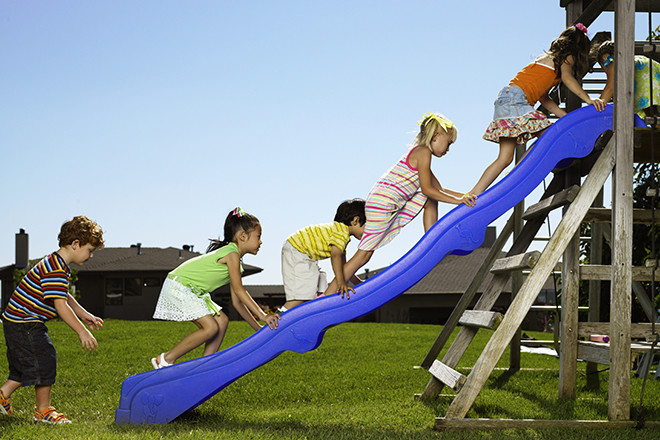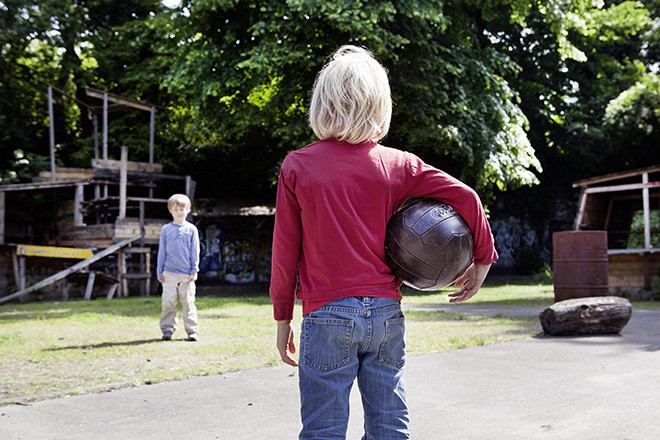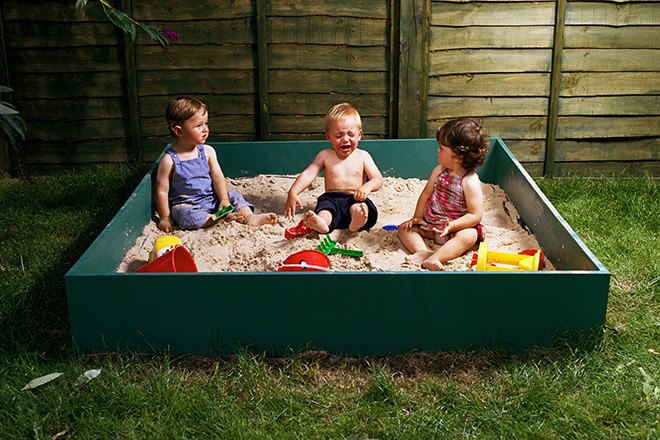Not sharing a toy or swing, some children withdesperately screaming, running for protection to mothers and grandmothers, others phlegmatically defend their interests with the help of bites and paddle defense. Some moms, like eagles, in constant tension - are ready at any moment to rush to the defense of their beloved offspring. Others sit in the shade on the benches, demonstrating complete indifference to the battles taking place at the site. Woman’s Day found out from the psychologist how to deal with situations that most often occur in children's playgrounds. Photo: Getty ImagesYelena Nikolaeva, medical psychologist
Photo: Getty ImagesYelena Nikolaeva, medical psychologist Playground conflicts are a phenomenonquite common, and our task is to reduce them to nothing. You should be attentive not only to your child, but also to the children around him. Treat other children the way you want them to treat your child. Your kid on the slide was “knocked down” by an older child, while his mother was next. You ask that child to be careful, but neither he nor his mother react in any way. What, then, should be told to the mother of the older child?
Playground conflicts are a phenomenonquite common, and our task is to reduce them to nothing. You should be attentive not only to your child, but also to the children around him. Treat other children the way you want them to treat your child. Your kid on the slide was “knocked down” by an older child, while his mother was next. You ask that child to be careful, but neither he nor his mother react in any way. What, then, should be told to the mother of the older child? This is an unpleasant situation.No one is ever allowed to hit or hurt other people's children, especially since it can harm your child's health. In addition, the slide is a dangerous place. Try to contain your anger, but be sure to reprimand the child who pushed another. Say: "You don't behave like that on the slide! You need to ride in turns!" Give your baby maximum attention, hug him, ask how he feels, if he is in pain. You do not need to take your child away from the playground and say that his offender is bad, that you should not play with him anymore. Children's grievances are short-lived, perhaps it happened by accident. You also need to take into account the age of the other child, maybe he was not told about the rules of behavior. Do not enter into polemics with another mother - an argument about parenting methods is pointless, everyone has their own opinion on this matter. Your task is to support your own child so that he feels safe and your support. Another child came up to the child and started to take away his toy, while his mother is either not there, or is there, but she does not consider it a problem. What to do in such a situation? How to communicate with such a mother?
This is an unpleasant situation.No one is ever allowed to hit or hurt other people's children, especially since it can harm your child's health. In addition, the slide is a dangerous place. Try to contain your anger, but be sure to reprimand the child who pushed another. Say: "You don't behave like that on the slide! You need to ride in turns!" Give your baby maximum attention, hug him, ask how he feels, if he is in pain. You do not need to take your child away from the playground and say that his offender is bad, that you should not play with him anymore. Children's grievances are short-lived, perhaps it happened by accident. You also need to take into account the age of the other child, maybe he was not told about the rules of behavior. Do not enter into polemics with another mother - an argument about parenting methods is pointless, everyone has their own opinion on this matter. Your task is to support your own child so that he feels safe and your support. Another child came up to the child and started to take away his toy, while his mother is either not there, or is there, but she does not consider it a problem. What to do in such a situation? How to communicate with such a mother? Children may react differently to suchsituation: one child will resignedly surrender, the other will try to keep or return his toy back, sometimes using force. Kids at that age are not yet able to understand that a toy is taken away not forever, but for a while, so for them it can be a tragedy. Another child may also not understand why you cannot take a toy that he liked (especially if the age of children is 2.5–3 years old). If there is a conflict and you see this, you need to intervene. First, you should support your baby by voicing his feelings: “Do you want to play with the machine yourself and want her to stay with you?” Then you can explain that the other child liked his toy and invite the children to exchange toys for a while . If the child does not agree, despite all the efforts, do not force, because this is his right! Another kid can say: "Sorry, but Vanya wants to play with his typewriter." If this does not help, try to captivate them with some other game or dissolve them in different directions. In a situation where the mother of another child is near and does not interfere with what is happening, ignores it, act in the same way without engaging in dialogue with it. After all, parents are engaged in upbringing, and you are helping your child with your actions without violating the rights of others.
Children may react differently to suchsituation: one child will resignedly surrender, the other will try to keep or return his toy back, sometimes using force. Kids at that age are not yet able to understand that a toy is taken away not forever, but for a while, so for them it can be a tragedy. Another child may also not understand why you cannot take a toy that he liked (especially if the age of children is 2.5–3 years old). If there is a conflict and you see this, you need to intervene. First, you should support your baby by voicing his feelings: “Do you want to play with the machine yourself and want her to stay with you?” Then you can explain that the other child liked his toy and invite the children to exchange toys for a while . If the child does not agree, despite all the efforts, do not force, because this is his right! Another kid can say: "Sorry, but Vanya wants to play with his typewriter." If this does not help, try to captivate them with some other game or dissolve them in different directions. In a situation where the mother of another child is near and does not interfere with what is happening, ignores it, act in the same way without engaging in dialogue with it. After all, parents are engaged in upbringing, and you are helping your child with your actions without violating the rights of others. Photo: Getty Images The situation is the opposite: your child takes a toy from another, he begins to cry.
Photo: Getty Images The situation is the opposite: your child takes a toy from another, he begins to cry. On the playground, there are usually many children andEveryone has their own toys. But the kid can see the toy, which he does not have, but he wants to play. So he is trying to get it. Tell your child: “I understand you liked this toy, you want to play with it, but it is a stranger. Let's ask permission to play, and then give it back. "So you understand, share the child's feelings and teach him certain rules of behavior and handling of other people's things. Further, in order to reassure another baby, you can offer in exchange to play with your toy or return it to his toy. You need to teach your child to respect both his and others' property. In the sandbox, another child begins to throw sand in your child. What should the victim's mother do? How to talk with the mother of the offender?
On the playground, there are usually many children andEveryone has their own toys. But the kid can see the toy, which he does not have, but he wants to play. So he is trying to get it. Tell your child: “I understand you liked this toy, you want to play with it, but it is a stranger. Let's ask permission to play, and then give it back. "So you understand, share the child's feelings and teach him certain rules of behavior and handling of other people's things. Further, in order to reassure another baby, you can offer in exchange to play with your toy or return it to his toy. You need to teach your child to respect both his and others' property. In the sandbox, another child begins to throw sand in your child. What should the victim's mother do? How to talk with the mother of the offender? Sometimes there are situations when your childoffend, throw sand. This can be either by accident or on purpose. This happens for various reasons: either the other child does not know how to communicate constructively, or attracts attention to himself and follows the reaction of others. Therefore, if you react too violently and emotionally, this may provoke the little bully. Say, briefly and clearly: “Do not do that!” Give your child maximum attention, ask if it hurts him, explain that the other kid does not understand that throwing sand is not good. Offer the option of playing together. Show, for example, that sand can be made kulichiki or tracks for typewriters. If necessary, take the child away from the playground. There is no need to come into conflict with the mother of the offender: looking at your low-key and correct behavior, the mother of the other child will draw the right conclusions and discuss this situation with her baby.
Sometimes there are situations when your childoffend, throw sand. This can be either by accident or on purpose. This happens for various reasons: either the other child does not know how to communicate constructively, or attracts attention to himself and follows the reaction of others. Therefore, if you react too violently and emotionally, this may provoke the little bully. Say, briefly and clearly: “Do not do that!” Give your child maximum attention, ask if it hurts him, explain that the other kid does not understand that throwing sand is not good. Offer the option of playing together. Show, for example, that sand can be made kulichiki or tracks for typewriters. If necessary, take the child away from the playground. There is no need to come into conflict with the mother of the offender: looking at your low-key and correct behavior, the mother of the other child will draw the right conclusions and discuss this situation with her baby. Photo:Getty ImagesThere is an opinion that if a conflict arises between children, then you should first find the mother of that child and solve the problem with her, through her, without raising someone else's child yourself. Or is there nothing wrong with making a remark to someone else's child?
Photo:Getty ImagesThere is an opinion that if a conflict arises between children, then you should first find the mother of that child and solve the problem with her, through her, without raising someone else's child yourself. Or is there nothing wrong with making a remark to someone else's child? First of all, it is necessary to ensurethe safety of your child. You can tell the offender that he can’t do that (but calmly, don’t yell). There’s no point in teaching that mother how to raise her child (“Your child is fighting, tell him that he can’t do that,” etc.). A “normal” mother will understand everything and talk to her child. The one who doesn’t care how her child behaves with other children won’t listen to you. A conflict between children can easily develop into a conflict between adults. In addition, you will set a bad example for your children. How should you react if another mother makes a remark to your child? Especially if you don’t agree with this remark or with its form (the mother yells, scolds, and scolds).
First of all, it is necessary to ensurethe safety of your child. You can tell the offender that he can’t do that (but calmly, don’t yell). There’s no point in teaching that mother how to raise her child (“Your child is fighting, tell him that he can’t do that,” etc.). A “normal” mother will understand everything and talk to her child. The one who doesn’t care how her child behaves with other children won’t listen to you. A conflict between children can easily develop into a conflict between adults. In addition, you will set a bad example for your children. How should you react if another mother makes a remark to your child? Especially if you don’t agree with this remark or with its form (the mother yells, scolds, and scolds). First of all, if that mother scolds you, then ask herDon't shout, but calmly tell you what happened. If your child is guilty, then say that you will sort out the situation. Apologize to that mother. It is better to take your child away and talk to him face to face, explain that this cannot be done. If you see that your child is being blamed in vain, then, without raising your voice and without getting into an argument, you can answer the other mother like this: "Thank you for your comment, but I do not think that my child is guilty. Keep your critical remarks to yourself!" Visitors to playgrounds are different. In one way or another, everyone interacts with each other, exchanges phrases, toys, mood. If at the same time each mother helps her baby build good neighborly relations with other children, and with her own reactions demonstrates a desire to protect peaceful fussing in the sandbox, then the playground will undoubtedly turn into a quiet haven, where both children and adults feel comfortable.
First of all, if that mother scolds you, then ask herDon't shout, but calmly tell you what happened. If your child is guilty, then say that you will sort out the situation. Apologize to that mother. It is better to take your child away and talk to him face to face, explain that this cannot be done. If you see that your child is being blamed in vain, then, without raising your voice and without getting into an argument, you can answer the other mother like this: "Thank you for your comment, but I do not think that my child is guilty. Keep your critical remarks to yourself!" Visitors to playgrounds are different. In one way or another, everyone interacts with each other, exchanges phrases, toys, mood. If at the same time each mother helps her baby build good neighborly relations with other children, and with her own reactions demonstrates a desire to protect peaceful fussing in the sandbox, then the playground will undoubtedly turn into a quiet haven, where both children and adults feel comfortable.

Making Money with Desserts: Success Stories
Evgeniya Polischuk (Fedutinova) instagram:@evgeniyafedutinovavk.com/janeshomebaking– It all started with baking for family and friends. Gradually, I started posting photos of my baked goods on Instagram – and orders started coming in. I made my first custom-made cake on October 13, 2014, and a little earlier I started making macaroons and cupcakes. You could say that the business “found me”, I am very […]

Soups are cold recipes with photos
Cold cucumber soup with yogurt and lemonsorbet from the chef of the restaurant La Taverna Alexander Zhurkin Photo: Getty Images Ingredients: Plain yoghurt – 125 g Cucumber – 150 g Lemon/lime sorbet – 50 g Cocktail shrimp – 24 g Fresh ginger juice – 1 g Lime juice – 5 g Fresh orange juice – 5 g Parsley – 1 g Pink pepper – 1 g Watercress – […]

barbeque kebab
Pork tenderloin in glaze Photo:Dmitry Bayrak/dbstudioPreparation time: 20 minutes + marinating time.Calories: 454 kcal per serving.For 4 servings: 4 pork tenderloins (approximately 300 g each), 1 onion, 2 cloves of garlic, 1 tsp. lemon zest, 1 tsp. lemon juice, a pinch of ground cumin, coriander and turmeric, 1 tbsp. vegetable […]

Pierre Duacan: dietary recipes: Ducane diet
Beetroot soup Photo:Season’S, Luxury Hotels RepresentationYou will need:· Boiled beetroot – 60 g· Fresh cucumbers – 20 g· Red radish – 20 g· Green onions – 10 g· Egg – 1 pc.· Drinking mineral water – 200 g· Salt – 1 gPreparation:· Boil the egg and beetroot.· Grate the cucumbers, radish and part of the beetroot. Put everything […]





